#the same goes for non fiction which is frustrating because it means i forget the cool facts i learn
Text
in hindsight it is amazing that I managed to get two literature degrees because I am terrible at remembering any details of any book I read
#all the rwrb movie stuff is making me realise i straight up do not remember anything#people being like 'omg the __ scene!' or 'what about __' and nothing is even ringing a bell#admittedly it's been like 3.5 years since i read it but still i should be able to remember more than just a vague overview of the concept 😭#the same goes for non fiction which is frustrating because it means i forget the cool facts i learn#the thing is i clearly have the ability to retain information from a book and think in depth about it#my brain just opts not to whenever it's not being graded i guess#talking
22 notes
·
View notes
Note
Wasn't sure where to reply to the post about there not being enough content about the Guild Wars 2 ladies but I will say for me personally, I definitely do tend to prefer playing with, fantasizing about, my male characters more.
My experience irl as a woman has been in some areas traumatizing, or there's been a lot of shame associated with concepts I wanted to explore as a character, for example: fighting, sex, being ugly, getting hurt.
It feels safer or more comfortable with a male character because it provides a kind of distance that allows me to explore and experiment with feelings and ideas that may not feel safe or open to me as a woman with certain experiences.
Further more, it's hard to identify with Guild Wars 2 female characters, as non of them are allowed to be ugly. Middle age does not exist visually in Guild Wars 2 for (human looking) women, nor do torn ears and split lips. They can't be fat, or even particularly muscular - even if they are a war marshal. You can't look monstrous without it coming across as some kind of joke either.
There is a kind of unreality, or an over idealization of female characters in mmorpgs whether it's a lack of customization options, or a lack of down to earth female characters. It always leaves me feeling like they're still forgetting their female player base sometimes.
Still, I do have female characters. I keep them pretty private because they feel more personal I guess. I'll try to make more effort to share them.
i really don't even know where to start here but i'll do my best.
i think in general i wasn't clear enough, i don't mean the game is misogynist at its core(or that it isn't), i don't even mean individuals are for the most part, i mean little things like that add up and then we have discourse like people shitting on Eir for being a bad mom (on a poll with Cadeucus like. hello?), but being wholly lenient on Rytlock for being in a similar situation where he was far less responsible. Or Caithe being hated eternally for her egg-tastrophe vs Canach's vigilante streak being widely ignored or joked about.
really, its got nothing to do with personal trauma, i can't tell you how to deal with that and if your way is good or bad for you or anyone else. i had someone approach me because they saw their bad relationship with their mother in Eir and admitted they were taking out personal frustration on a fictional character. we all have issues and hangups and ways of dealing with it, that's not the issue, the issue is if it starts affecting how we treat others because of it.
you don't have to sit and try to appease the criticism i make either, just...think about it?
like honestly bringing up womens' appearance ingame is a valid point if it were actually related to what i was saying, but also none of the men in gw2 are really fat either. its a problem persistent in the wider video game industry, not just gw2--i'm talking specifically about the gw2 fandom on tumblr, and my experiences here. which i'm finding i'm not alone in feeling this way, and its kind of frustrating to have an ask like this show up, missing the point and making it personal. its really not about anyone specific!
maybe i wasn't clear enough but its not a gw2-only problem. its the same thing that happens in every fandom. which doesn't make it right, it just...goes unspoken about and it makes people feel like no one cares.
just asking folks to think about where their biases lie, and hell, not even to stop at how they think about fictional women, keep asking yourself if your hatred or dislike or boredom with a character is because you genuinely feel that way or if you have some internalized things that you maybe need to work through.
24 notes
·
View notes
Text
Analysis of the Family Agreste Portrait
Quarantine strikes again and since the Agreste family portrait has fascinated me for a loooong while now I decided to put my thoughts into words and write another essay x3
The amount of informations we get out if it is amazing and its not only highlighting the absolute TRAGEDY it is that this family is about to face such a horrible fall out, it also hints at the former family dynamic before everything went to hell.
So make yourself comfortable and get something to drink, because we will be here for a while.
Here we go: My analysis of this beauty of a fictional portrait
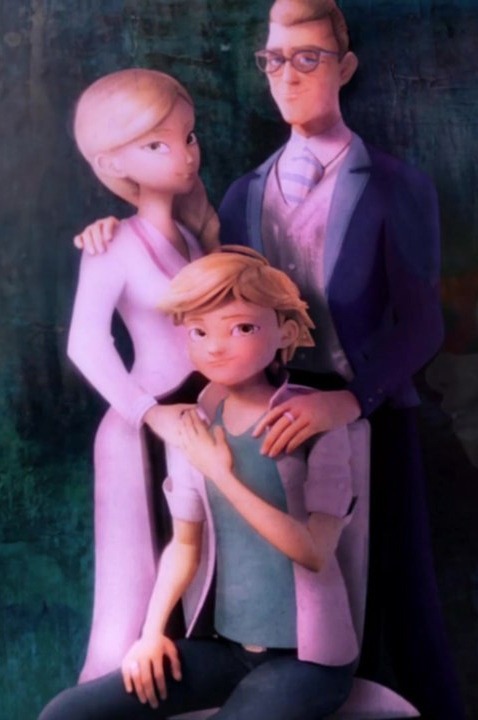
Let's start with the most obvious one: Hawkmoth.

Its commen knowledge by now that the background makes it seem like Hawkmoth is standing behind the Agreste family like a bad omen waiting for fate to take its course and cause their doom. The portrait is brilliantly designed so the illusion is created that Gabriels body (here in a blue suit closer to Hawkmoths normals dark purple one) overlaps with Hawkmoths and a darker line is connecting the two faces as well, which rest on the same height right beside each other. The very same line grows bigger as it goes further behind Emilie - coloring her entire background - showing us that EMILIE is all Gabriel sees when he becomes Hawkmoth. But notice that Adrien on the other hand can hardly be concidered part of Gabriels “sight” at all.
Its forshadowing 101 and damn beautiful if I may say so. But this isnt what I want to focus on in this post.
I want to elaborate on two other key factors that tell us about the former dynamic of the Agrestes instead and what they tell us about the present and future.
The heart:
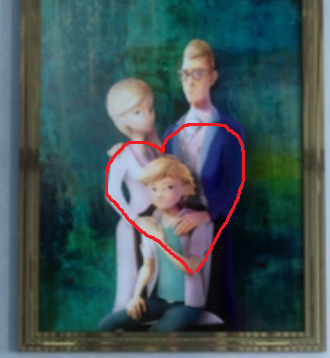
This is hitting me on another level because look at the heart these three form with Adrien right in the middle! He was so LOVED. This family may have never been anywhere close to ideal but still, there was LOVE and now he's gonna loose it all.
Adrien already lost his mother which led to his father getting even more distant and cold and now his father is becoming increasingly more abusive as he falls deeper and deeper into villainy. Gabriel was never a good father, the show has already made this clear with episodes like "the bubbler", “the collector” or "Gigantitan" for example but gosh there was hope for their little family! The end scene in "Jackady" portrayed it perfectly and I wrote a whole other post just covering the sigificants of Adriens and Gabriels hug in that episode. Check it out here if you want, it goes hand in hand with this one.
Miraculous is all about love and the completely different ways it can affect us, our behavior and actions. Because love isnt just wonderful, pure and empowering, it also can be twisted, destructive and cause the darkst nightmares. And with this family the writers know how to portray the complex love in an abusive houshold thats destined to go up in flames and they also know how to hint at their troubled past with the family portrait.
But this heart visual tells us even more in connection with the positions of their hands. And with these two key factors, lets start with Gabriel:
His hands convey it so strongly. He loves/d Emilie and Adrien so much and no doubt this love for them was certainly the reason why he started his quest as Hawkmoth. But he is now losing himself more and more in the pleasure of his villainy to the point where he forgets why he's doing it in the first place and becomes a complete monster (of a father). But this turn and spiraling into villainy didn't came out of nowhere - this root already had to be in him to grow like that. And this is also something the portrait indeed hints at as well.
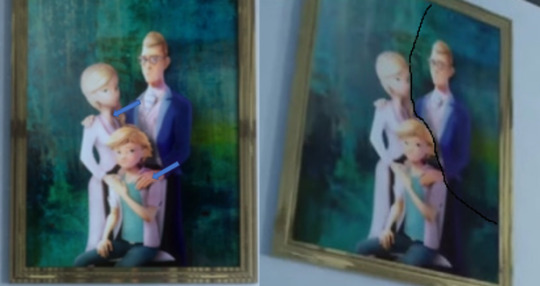
Because Gabriel is the only one of the three who:
1. We see so completely open and without hesitation reach out and hold BOTH his family members.
2. Is visually “cut off” from them as well.
But this doesn't mean he was excluded and the only one who truly cared and loved, it just shows that things were more... complicated...as usual.
This is best explained with Adriens hand placements:
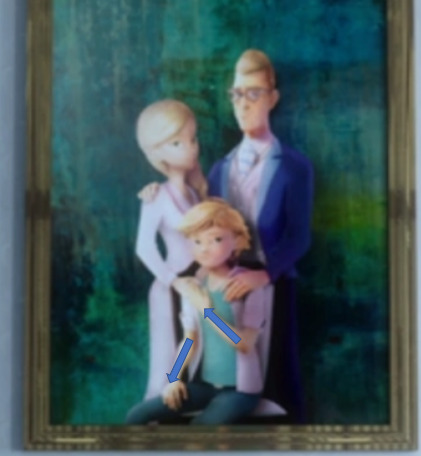
One hand is holding his mothers but the other one is visibly not reaching out for his father. But as we all know, that's not because Adrien doesn't love him. In season 1-3 it is made more than clear that Adrien does not hate his father - he loves him alot and tries to be there for him and be patient because he knows that the loss of his mother brought his father terribly down.
Sure, Adrien gets frustrated and angry with him, literally how could he not?? But Adrien tries his best to reach out to Gabriel so they can bond and come out of this tragedy stronger.
But this loving willingness to forgive his father for the chance of growing a father-son bond with him doesn't change the fact that these two didn't had a bond prior to this. And let's be honest here, does anybody actually think this distance between them was caused by Adrien? I don't think so.

So notice how Adriens hand - not reaching out for his fathers - is the only one in the portrait NOT inside or forming the heart.
When the connection of the hands between the family members symbolise their connection to another, then Adrien keeping the hand for his father away from the display of love is VERY telling. It tells us very directly what this distance did to Adriens side of the relationship. Despite Gabriels hand being right there, Adrien does not meet the gesture. And I cannot believe that he did it out of resentment, nothing in the show indicated such strong negative emotions from past Adrien.
It's much more likely that Adrien not reaching for his fathers hand is meant to show us that Adrien felt that he either CAN'T return the gesture because he fears that it'll end in an unpleasant reaction from Gabriel - that it isn't Adriens "place" to reach out to his busy and distant father like that, like it's demanding something - or Adrien simply didn't took Gabriel laying his hand on his shoulder, in the context of posing for a portrait, as a gesture of love and affection.
The way I interpret the portrait is that prior to Emilies dissappearence Adrien did not exactly try to reach out to his father the same way he did from s1-s3, which, I mean, of course wasn't the case. Not only is it NOT the 13 years olds (or younger) job to form an emotional connection to their absent parent - when that’s the PARENTS job - it also wouldn't be necessarily "needed" for Adrien to do so.

Because Emilie at this point was still in the picture so and she was the complete opposite. She was a (or maybe the ONLY) safe, reliable and loving constant of parental attention, affection and care in his life and because of these two HARSH contrasts Adrien learned from very early on to focus mostly completely on her in that regard while kinda blocking his father out.
That most likely wasn't even an active choice whatsoever - Gabriel proofed to be an unreliable resource so Adrien learned to subconciously treat him that way out of self protection. That doesn't mean he had any kind of dislike or malice against his father it just means that he wasn't able or allowed to connect with Gabriel the way he needed. Several episodes show that Gabriel deadass only parented like 15 minutes tops in his life with one of the worst offenders kinda being “Gigantitan” ngl.
So yeah, when I see that the portrait wants to tell me that prior to Emilies loss, Adrien - a 12-13 year old at most - is THIS used to rely solely on the strong bond he has with his mother and not even really reaching out for his fathers love, then I can't help but interpret it in the way that... Well... Gabriel was so distant and emotionally unreliable to Adrien for all his life, that Gabriel simply... wasn't needed by his son. Not at that point of time at least.
And while this may seem weird, because obviously Adrien only now starts to stop craving for his fathers affection and approval (which is btw a horrible, HORRIBLE thing and not something good. A half orphan losing the last remaining hope he had left of having the chance to finally get to form a bond with the only other parent he has left, just to be crushed by disappointment and abandonment all over again until he let's go, is REALLY NOT as much of a good thing people will make it out to be. This is... plain awful) it's actually quite logical.
Adriens hand outside the heart doesn't mean that his father meant nothing to him and therefore refuses to meet and accept his affection (that's literally the complete opposite of what the show shows us), it means that Adriens and Gabriels father-son relationship suffers from a fatal emotional disconnection caused by miscommunication/ a lack of communication.
And this was caused by Gabriel. How? Let me elaborate on that by going a bit far afield (cuz lbh we all have time for this. I’m writing this in quarantine and youre reading this is quarantine, so lets gooooooooooooo).

In "The bubbler" Adrien says that his father "always forgot his birthday", but I cannot agree with this in true honesty. Gabriel is controlling his sons entire life, calls him "the epitome of perfection" and temporarily truly gave up being Hawkmoth for him, he definitely never forgot Adriens birthday.
"The bubbler" even SHOWS us that Adriens perspective of the situation is actually not the truth:

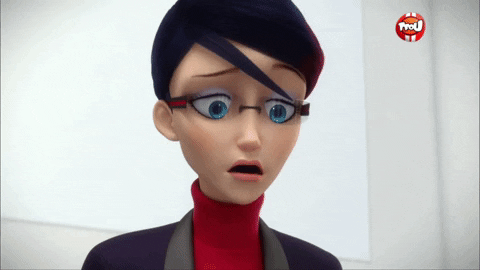
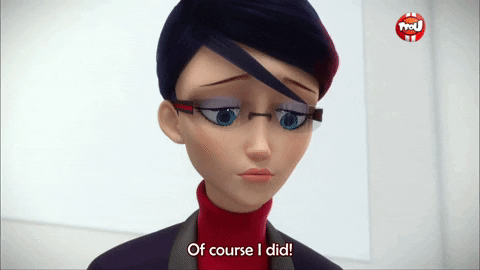
This is Adriens first birthday after Emilies dissappearence and it's incredibly telling how Gabriel handles the planning.
What this entire little sequence tells me is that Gabriel is completely and UTTERLY used to NOT be the one to take care of anything related to Adriens birthday. So Emilie was always the one who did it but somehow - now without her - Gabriel apparently still hasn't even considered changing anything about that nasty non-involvement and just expected Natalie to pick everything up where Emilie left it.
Because let's be real here, knowing Natalie she would NOT have forgotten to get a present if Gabriel truly had told her to. Natalie is never presented to do mistakes like that but Gabriel on the other hand IS definitely presented to us claiming things about himself as ultimate, blameless and true when they simply do not reflect reality. A great example: Gorizilla
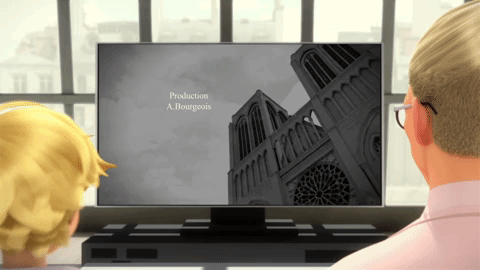
You didn’t even speared a minutes of your time for Adrien and he DID try to! Asshat… It's a problem guys. The lack of self awareness Gabriel displays in moments like this is legitimately concerning when you think about how deeply this man is falling right now.
But back to the topic:
Because even if Gabriel didn't even consider doing anything himself for Adriens birthday - not even taking the time to SEE his son (who just recently lost his mother, come on Gabe, really?) - one thing one cannot hold against him: he sure as hell remembered Adriens birthday like any decent parent would and it wasnt portrayed as a this-year-for-the-first-time thing.
And yet Adriens statement still makes complete sense. Because a big, BIG problem with Gabriel is just how much he takes things for granted. He EXPECTS things to be universally known and to never be doubted, just because that's how HE sees them. I will write 10 essays if it's needed to make people understand that Gabriel DOES truly love Adrien, it's just that Gabriel HIMSELF is such a rotten, twisted and toxic person that he cannot see how much his (oppressing) behavior and the way he (doesn't) express his love hurts Adrien and that HE is the one at fault. (for more, once again, read this)
Gabriel LOVES Adrien but he takes the love he feels as such a matter-of-fact that he just completely... forgets to show it.
And when we take Adriens words and look at the Family portrait it unfortunately seems that...

…. Gabriel ALWAYS forgot to show it.
Adriens hand - that should at least be reaching out to his father - is outside of the heart in accepting certainty. Because that's what Gabriels non-presence was for Adrien while growing up: an unreliable and unreachable certainty he had to accept early on as safer to not try to emotionally depend on too much or else he will get hurt.
So yeah, Adrien is the one in the portrait who is very openly not reaching out but only because Gabriel never gave him the needed affection and stability to be able to create that bond.
But let me correct what I said a little earlier: Adrien ALWAYS needed his father. Every kid, especially one in a bad situation like Adrien, does need their parents/friends etc as support system to become independent and confident in a healthy way. And if they don’t have that they WILL crave and look for it!
What Adrien has been doing up to now IS normal for a teenager - humans NEED affection, belonging and safety. What ISNT/SHOULDN’T be normal is Adriens disconnection towards his father in the portrait and just how much Gabriel fails to take care and BE THERE for his son in BOTH TIMES!
Collector:
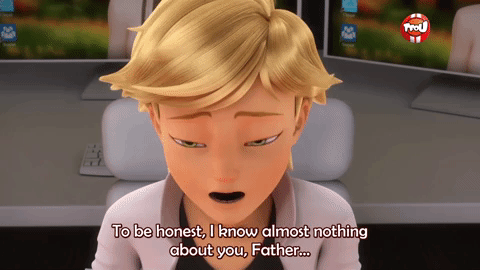
Bother Christmas:
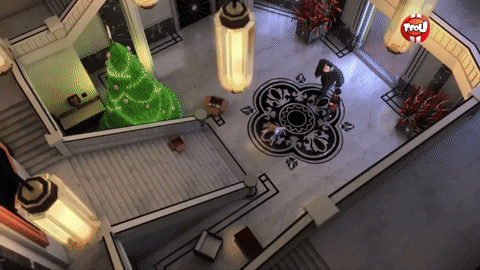
One thing I like about the show is that it portrays their young main cast with one very important truth: The psyche of a child/teenager of their age will react and adapt so it SURVIVES, even if it results in unfortunate consequences in other relationships and places. Thats the psyches main concern and it'll try to cope with the limited experience and development it has in whatever way necessary to get itself to the next day. A coping mechanism is not there to make you a better person, it ensures your SURVIVAL, everything else is a secondary concern.
So seeing pre-show Adrien not react to Gabriels touch and even feel completely unloved and disconnected from him is no surprise to me. Kids are incredibly observant. They may lack the needed experience and knowledge to truly understand that they deserve better and to stand up for themselves but they are masters in picking up red flags in people and can put this danger into perspective while comparing the different danger levels of their options of people and places to adjust their behavior.
Feast:
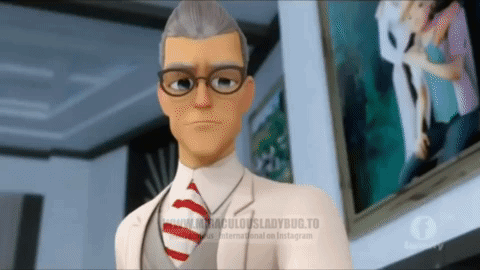
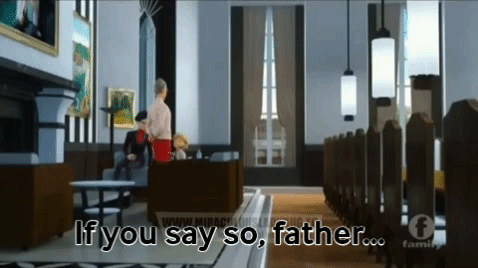
Stormy Weather 2:



So the broken connection between father and son we see in the portrait (that Gabriel doesn't even notice but Adrien fully internalized) isn’t there because Adrien “didnt needed” or wanted his father, its because Adrien NEEDED Gabriel so much in his isolated upbringing but Gabriel didn’t LET him need him - so Adrien had to adjust to that accordingly. Big, huge, ENORMOUS difference.
Honestly the most miraculous thing about Miraculous is that Adrien was able to bring up the strength to stay positive and friendly and to forgive Gabriel in hope for a better future. That boys situation is 7 kinds of depressing and traumatizing...
It's just flabbergasting to me how well this portrait shows how basically non-existent their relationship was at that point. And it's horrible to know that this estranged and unformed bond is all Adrien had left after Emilie dissappeared, just alot worse because after Emilie incident Adrien states that his father changed alot for the worse as well.
So to think that all Adrien had left wasn't even this former basically non-existent relationship with his aloof father - who would only barely show his true affection for his son because he's either not around enough to do so or he thinks it "unnecessary to proof his affection" for/to Adrien because he already thinks it so obvious and undoubtable.
Well he thought wrong. And GOSH, it breaks my heart!
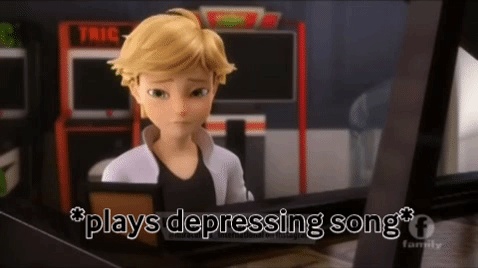
So now comparing the "Gabriel" hand from Adrien with the one representing his connections with his mother conveys a pretty harsh contrast.
Because last but not least, let's take a look at Emilies hand placements:
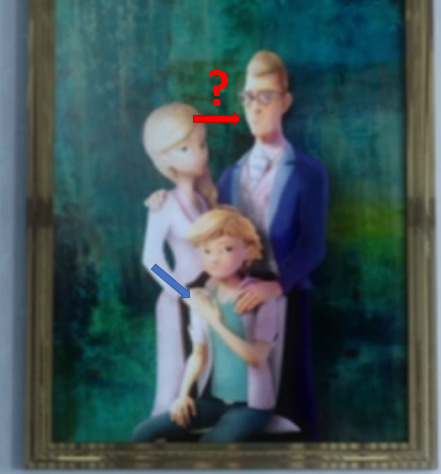
But here is now an interesting difference to Adrien. Whereas we openly see that Adriens side of the Adrien-Gabriel relationship is completely disconnected from the heart/love - showcasing just how badly Adrien has always been neglected by his father - we don't see Emilies hand in her Emilie-Gabriel relationship AT ALL.
Once again just like with Adrien, this doesn't mean she didn't love her husband and that Gabriel was used and fooled by the woman he so utterly adored. It just means that from Emilies point of view things were a bit more complicated. What exactly this is, the portrait is keeping secret from us. We have no way of knowing if and how Emilie is returning her husbands gesture. All we can say is that if she does she is definitely not doing it in such an open and unconflicted way as she does with Adrien.
But since when has anything with this family been this easy?
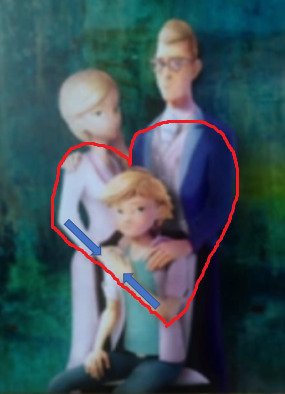
One thing the portrait makes very clear, Adrien and Emilie had a strong and good bond. Definitely the healthiest because the Adrien-Emilie connection is the only one depicted without any kind of disruption from both sides. Both mother and son are reaching out for the other ones hand creating a whole half of the heart, showcasing their affection for another openly and without any of the implied doubts the other connections display. And honestly? Comparing all the hand placements, the one connecting Adrien and Emilie just comes across as strikingly pure and true (which makes it even worse that it was HER Adrien lost…)
As I said it's a HARSH contrast to the one Adrien shears with Gabriel. This contrast is highlighted even further by the way these three face on another.
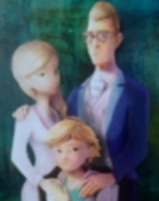
Emilie and Adrien are positioned facing another and so are Emilie and Gabriel. Telling us that Emilie was "face-to-face" aka involved with both her husband and son. It is Adrien and Gabriel were this looks wildly different. These two have no way of seeing each other in the eyes the way they stand now/then, further displaying their deeply rooted disconnection. It's portrays perfectly how important Emilie was in this family dynamic, because even though Adrien and Gabriel bearly had a connection at all they at least had Emilie as a link between them, keeping the family together. But then they lost her and where this left both father and son off we know oh too well...

So to collect all the informations we get out if this portrait:
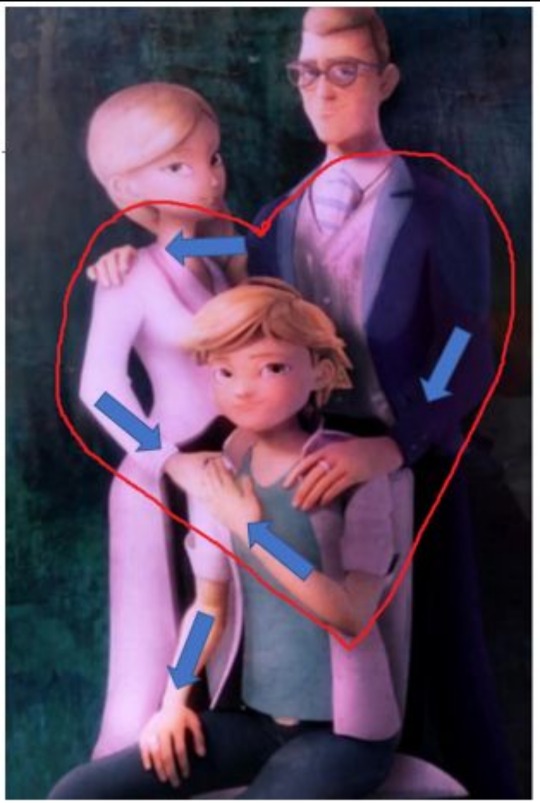
-Adriens and Emilies relationship was the strongest and purest. Both of their hands connect and reach out for another in the heart, showcasing that they had a loving and positive bond.
-Adriens and Gabriels relationship is heavily scarred by a deeply rooted disconnection leaving Adrien feeling unloved and unwanted by his father to the point where Adriens side of their dynamic is outside the heart altogether. Gabriel may love and adore his son just like he loves his wife and never thought he displayed his love for him in a lacking way, but fact is: this love never reached Adrien the way it should have and Adrien is the one in their dynamic who got severely hurt and damaged by it.
-Gabriel was the only one completely unconflicted and happily at peace with the former Family situation. He's reaching out to both his family members with open love and affection in blissful oblivion that neither his wife nor son could return them the same way (to different degrees for different reasons). Gabriel was the ONLY ONE in the Agreste family who didn't saw problems in their lives and thought them all happy, hence why he's so obsessed with changing the past and bringing THIS state of their family back. He was happy and he had everything he needed and loved right with him, of course he wants THIS back. He's not aware that Emilie and ESPECIALLY Adrien did not feel the same about their former situation and that bringing all of them back to this is not the perfect happy ending for their entire family as he thinks.
-Emilie may not have been as unconflicted with Gabriel as he was with her but she is NOT feeling the same disconnection her son feels and isn't depicted with negative feelings towards Gabriel. Her side in the Emilie-Gabriel relationship is neither shown outright positive as with her son or outright bad as Adrien with Gabriel. Her side of their bond is depicted through her unseen hand placement in the unknown area in between.
-Despite their not so unconflicted feelings towards Gabriel - and Gabriel himself being aloof - neither Emilie nor Adrien are actively trying to cut Gabriel out. They aren't flinching away from his touch or exclude him from the heart whatsoever. He's happily included, obviously feeling loved. They may not be 100% happy and Gabriel doesn't notice it, but they aren't denying him his happiness and make him unhappy. Again, he's the only one truly happy here. Something neither Emilie nor Adrien tried to take away from him.
-Emilie and Adrien are facing each other as do Emilie and Gabriel, implying the presence of communication and a bond. Adrien and Gabriel do not face each other, showing their disconnected bond. If they could see each others face Adrien would have been able to see that Gabriels hand is a gesture of genuine affection and Gabriel could see that Adriens expression does not exactly display pure happiness the way he thinks. This also goes for Emilie. Emilie just like her husband is placed BEHIND her son, so even if she is facing him she would not be able to really see just how much Adrien is not satisfied and truly happy with his life at that point (meaning how unhappy being looked up, friendless and at distance with his father actually makes him).
- This fascinating family makes me sad and I like it lol
#Miraculous#Miraculous Ladybug#adrien agreste#Gabriel Agreste#Emilie Agreste#family agreste#Agreste tragedy#natalie sancoeur#Agreste family portrait#Chat Noir#Cat Noir#hawkmoth#le papillon#ml analysis#this family is fascinatingly depressing to think about#I love them#I want Adrien safe and sound and loved with the Dupain-Changs#because everything Agreste is doomed and I want my son to be happy#Gabriel Agreste needs priorities#and Emilie needs to tell me what the fuck she did to set all of this off
734 notes
·
View notes
Text
Gaslight, gatekeep, girlboss: Mrs Coulter, misogyny and the His Dark Materials TV show
The show went hard on misogyny as a vital part of Mrs Coulter’s backstory, and I want to talk about how they did it, and why, and how it might have been done better. This is quite long (when is anything I write not, let’s be real) so it’s under the cut. Read on for thoughts on women, power and fictional villainy.
As a quick disclaimer, though: I’ve enjoyed the show a lot! I’m so glad they made it! Ruth Wilson is mesmerising as Mrs Coulter! There’s so much to appreciate about the show overall, including many aspects of Mrs Coulter’s portrayal. But the HDM team have also made gender politics and misogyny very explicit themes of the show – particularly season two, particularly season two, episode five – and I think it’s fair to critique that.
Let’s be clear: Mrs Coulter is a villain. She murders kids by tearing out their souls. She kills and tortures friends and foes alike without a second thought. She abuses her daughter. She upholds and advances a totalitarian regime. She’s a Bad Person, as confirmed by God himself with the unforgettable line: “You are a cesspit of moral filth.” She’s fucking terrible, but, in life as in art, many of us are fascinated by how such awful people are made. What drives someone to commit atrocities? I am keen to see such questions examined in fiction, because I don’t think exploring a character necessarily means excusing their actions, and because it’s interesting (I mean, of course I find her fascinating, I’ve written a novel’s worth of fic about her). However, after a few snarky comments (“What sort of woman raised Father Graves, do you think?”) and some subtler commentary on sexuality, gender and power (her unsettling MacPhail with the key in the bra in S1E2), S2E5 drew a weird line between sexism in Mrs Coulter’s professional and academic life and her vast and senseless institutionalised child murder, and the longer I’ve sat with that the more I’m like: what the fuck?
Look, Mrs Coulter doesn’t tear apart children to search for sin inside them and poison Boreal and break a witch’s fingers because she’s experienced sexism in the workplace and in her education. That’s… a very odd thing to imply. We have to remember that there are lots of women in Lyra’s world, all of whom will also have experienced sexism, misogyny and other forms of marginalisation (many in more expansive and pernicious ways than Mrs Coulter, who’s a woman, yes, but also white, wealthy, highly educated and very thin and beautiful), and none of them are running arctic torture stations. She will have experienced misogyny, absolutely, and that will have affected her in various ways that inform how she approaches her work, but to imply that being denied a doctorate is the reason she became a sadistic killer is frankly bizarre. Here are a few of the lines from that episode with my commentary:
“Do you know who I could have been in this world?” What does this mean? If she’d been roughly the same person in our world, the answer is: Margaret Thatcher, which is probably a step down for Marisa, all things considered, because the Magisterium is far more autocratic than any recent Tory government and would be a much easier institutional environment in which to enact her cruelty. What we’re supposed to think, clearly, is that she’d have been a different person: a scientist and a mother, and she’s had this realisation because she saw a woman with a baby and a laptop and had a three-minute conversation with Mary. This doesn’t make sense. We live in our world! It’s less repressive than Lyra’s world but it’s hardly a gender utopia. If Mrs Coulter had chosen the scientist-and-mother life (which, as I’ll revisit later, she could have done in her world but chose not to because of her megalomaniac tendencies), she’d still have been affected by misogyny here too. Our world is not kind to young mothers, nor young women embroiled in scandals, nor is the world teeming with female physicists. It might be a little better, sure, but it’s hardly as if those gendered challenges would have been solved.
“What do you mean she runs a department?” This is just the show forgetting its own canon. Marisa, you ran a massive government organisation (the GOB), including a huge murder science research initiative in the Arctic. That’s a much bigger undertaking and much more impressive than running a university department in our world. Pull yourself together.
“But because I was a woman, I was denied a doctorate by the Magisterium.” This is the show flagrantly ignoring the source material to make a clumsy political point. In the books, there are women with doctorates (notably Hannah Relf, also a major player in the new Book of Dust trilogy) and at least one women’s college full of female scholars. Now, would that women’s college likely be underfunded and disrespected compared to the men’s colleges? Almost certainly. But saying that is different than saying “I couldn’t get my doctorate!” when women in Lyra’s world can. The show knew what point they wanted to make, and were willing to ignore canon to do so, which is frustrating. Also, given that there are female academics and scientists in Lyra’s world, and that Mrs Coulter is a member of St Sophia’s college, it’s clear that she could have lived that life if she so desired. But she didn’t want that, because being a scientist and academic at St Sophia’s imbues her with no real power, and that’s what she craves.
I’m not opposed, in theory, to exploring Mrs Coulter and misogyny in more depth, but I think doing so through an examination of the sexual politics of her life would have made a lot more narrative sense and been much more powerful. It’s better evidenced in the text – her using her sexuality to manipulate people and taking lovers for political sway is entirely canon, as is her backstory where genuine love and lust blew up her life – and it links much more closely with the most shocking of her villainy, which involves cutting out children’s dæmons to stop them developing “troublesome thoughts and feelings,” referencing sexual and romantic desire (and what Lyra and Will do to save Dust is clearly a big ‘fuck you’ to those aims). She even says this to MacPhail in TAS, “If you thought for one moment that I would release my daughter into the care - the care! - of a body of men with a feverish obsession with sexuality, men with dirty fingernails, reeking of ancient sweat, men whose furtive imaginations would crawl over her body like cockroaches - if you thought I would expose my child to that, my Lord President, you are more stupid than you take me for.” Don’t get me wrong, she’d have been a villain regardless, but I do believe that there’s a much stronger link between her sexual and romantic experiences and her murder work than between professional and academic stifling and child murder. It would have been a lot more interesting and a lot less tenuous.
However, the show is trying to be family-friendly, and digging into why this terrible, cruel woman might want to cut the ability for desire and love (and other non-sexual adult feelings, I’m sure) out of people could get dark. We know that the show doesn’t want to go there, because they’ve actively toned down her weaponising her sexuality: in the books, she has an established sexual relationship with Boreal, whereas the show made it seem like she’s been stringing him along all this time, and made it about potentially ‘sharing a life’ together rather than fucking, which was clearly the arrangement in the books. Also, I think Ruth Wilson said she and Ariyon Bakare filmed a “steamy scene” together, and given that only a single chaste kiss between them aired it must have been cut. I think they deliberately minimised the sexual elements of the text, particularly regarding Mrs Coulter (the mountain scene with Asriel, which I did still love, was also a lot less horny than in the book) and replaced that with another gender issue, that of professional sexism, as if the two are interchangeable, which they are not. This is a shame, both for Mrs Coulter’s character and also for the story as a whole, because the characters’ relationships with sex and desire are an important part of the books! (If this minimised sexuality approach means that they don’t use the TAS scene where Asriel threatens to gag her and she tries to goad him into doing it, I’ll scream). Overall, I think they missed the mark here, which is a shame because I also think it could have been done well, if they’d been bolder and darker and more thoughtful.
Why might this happen? Why might the show take this approach? Why might it be latched onto by viewers? Personally, I think the conversations we have about women and power are very simplistic, which leaves us in a tight spot when we see women seizing power for themselves (even in fiction) and weaponising that against others, not just other women but people of all genders, because we struggle to move past ‘women have overall been denied power, so them taking it ‘back’ is good,’ even if that immediately becomes a hot mess of white, corporate feminism and results in the ongoing oppression of many people. I think we are so hungry for representations of powerful women that we – producers and viewers alike – struggle to see them as bad, because it’s uncomfortable to be so intoxicated by Mrs Coulter effortlessly dominating the men around her, subverting systems designed to marginalise her for her own benefit, and generally being aggressive and intelligent and ruthless, and then realise that you are entranced by someone who is, objectively, a terrible, terrible person. It can be hard to realise that if you channelled the energy of someone who mesmerises you, you’d be the villain. So instead of sitting with that (more on this below), a lot of legwork goes into reworking her villainy into, somehow, a just act, a result of oppression, as her taking back power that has been denied to her, rather than grappling with the fact that for anyone to desire power in such a merciless way, even if they have to overcome marginalisation to get it, is really, really dangerous.
The joy, of course, is that Mrs Coulter is not real! She’s not real! Adoring fictional characters does not mean condoning their (imaginary) decisions, nor do stories exist for each person in them to fit neatly into a good or bad box so you know who you’re allowed to love. Furthermore, fiction can be a fabulous tool for exploring and interrogating the parts of yourself that, if left to bloom unexamined, might perpetuate beliefs or behaviour that cause harm to others. Mrs Coulter doesn’t need to be a feminist or taking down the patriarchy or a righteous powerful woman to illuminate things about gender, power and feminism for those reading and watching. In fact, it’s important that we explore what happens when women (most commonly white, wealthy women, as she is) continue to perpetuate brutal systems under the guise of sticking it to ‘men,’ because it happens all the time in the real world, and it’s a serious issue. Finding characters like Mrs Coulter so cool and compelling doesn’t make you a bad person, but it might tell you something about yourself – not that you want to be a villain or kill kids or whatever, but something about how you relate to your gender or women or men or power – and that knowledge can be useful! We all have better and worse impulses, and finding art that helps us make sense of ourselves, both the good and bad parts, is a gift that we should relish.
Anyway, tl;dr, Mrs Coulter doesn’t need to be sympathetic or understandable or redeemable to be brilliant – but you wouldn’t know that from how she’s been portrayed in the new adaptation.
#his dark materials#marisa coulter#my analysis#this might be controversial idk#more thoughts that no one asked for#hdm meta
210 notes
·
View notes
Text
Hill House, and Audio Horror vs Film Horror
I got to thinking about this when an audio producer on Twitter asked what people thought the scariest parts of Haunting of Hill House, other than the jump scares. What struck me while reading the responses were almost all things that depended on the visuals, and would be very hard to move into the realm of audio.
I feel like many/most people think of horror movies as a template to build off of for horror audio fiction...which is fair, because for many of us, horror audio fiction wasn’t a thing we could find to listen to until recently (myself included). And it’s not uncommon to hear a successful, talent audio producer say something along the lines of “An audio drama is like a movie, without needing a million dollar budget.”
I agree with the thought, generally: audio fiction does have many similarities to film, but if you stretch it too far, it can be a dangerous approach. And it can be especially dangerous for Horror.
Let’s think about how we could move the Bent Neck Lady into audio (spoilers ahead). Except for one scream, she is silent and unmoving. To move it into audio, we’d either need a narrator (or someone to tell us what’s happening), or to make Bent Neck Lady move around. The first option would keep the nature of the ghost intact, but we would be robbed of having it happen in front of us. The second option would change the nature of the ghost entirely. This is before we even talk about the twist, that hinges on Bent Neck Lady largely being a silhouette, which obscures information without feeling like anything.
Horror is a genre that is especially dependent on craftsmanship, regardless of the medium. It’s a genre where--and you’re going to murder me for saying this--you don’t need a good story to be scary. You need a scary situation/scene, told with skill, but even if the scenes/plot/characters around it are terrible, you can still make the audience feel afraid (Looking at you, Argento).
That’s not to say the story doesn’t matter. In fact, a large part of what makes Haunting of Hill House so good is that it’s part horror, but also part family melodrama (and it actually spends more time on the melodrama than the horror), blended together so the ghosts have meaning. Bent Neck Lady is disturbing the first time you see it, but it’s the story behind it that makes her stay with you long after you’ve finished the show.
But if we set aside the story, and focus on the scary moments...they are pure filmmaking. Every aspect is working to create fear: the sets and art direction, the creature design, the pacing, the blocking, the editing, the sound design.
The same way a horror movie uses every weapon of filmmaking, a horror audio drama should use every weapon of audio to create dread/fear/suspense. But the flip side is, just as Haunting of Hill House isn’t using the tools of horror literature, your audio drama shouldn’t try to be a movie.
But I think we also need to own up to something: many of us (most of us?) have more experience watching horror movies than listening to horror audio dramas. So let’s get analytical here. What are films strengths? Audio’s strengths? Weakness? And how do these work in service of horror? Any tips for the audio drama producer?
Filmmaking’s Unique Gifts
Before I get into the list, I want to be very clear: I’m not to saying you can’t do versions of this in an audio drama. In fact, when these are successfully used in audio, they can be outright amazing. But they take a lot more work, either by carefully setting up signature sounds*, or by having narration, or some other creative way no one has done yet. The point of this list is that film does these things easily.
There are some obvious things, like, ya know, visuals. I don't think there's any amount of words or sounds that would allow me to imagine Giger’s Xenomorph. Some things just need to be seen.
One of film's special talents is it gives the audience an understanding of a location without even trying. I don’t mean the layout of a house (that can be confusing), but present an audience with one shot of a bedroom, and they’ll instantly understand where the bed is, the window, the door, the closet, the bedside tables. Films communicate small spaces so easily, they don't even need to stop to do it…a character walks in the room doing whatever, and as long as the space is seen by the camera, the audience gets it.
In horror, this is vital when the fear you're trying to create is that of a physical threat. Where is the killer? Behind the bookcase? Walking towards you from across the lawn?
Related to this idea of a physical space, films also have the ability to makes things appear--and disappear--quickly and unexpectedly. This is moments like Mike Meyers appearing in the closet in Halloween, or later, when Dr. Loomis looks over the edge of the Balcony, and Michael Meyers has vanished.
Perhaps film’s most famous strength is the montage. You can easily cut between different scenes and settings, without the audience ever getting confused.
There is one tool of film that I am very frustrated won’t work in audio: the Title Card. I don’t mean the title of the show, I mean those cards that say things like “Burbank, CA” or “CIA Headquarters” or “3:23pm.” Text on screen is a painless way to give the audience information without tripping up the storytelling.
Finally, let’s talk about one of film’s most powerful tricks...patience.
A film can stretch moments out, sometimes with slomo, but often with editing between close-ups. You can also have moments where nothing happens, you just linger in the mood/ambience/characters reactions.
A great example is the “Spielberg-Face”, those shots when the characters are reacting to something the audience hasn’t seen yet. In Jurassic Park, we spend a full 30 seconds watching jaws drop before we see the first dinosaur. This is pretty nuts, when you think about it. The true stars of the movie aren’t introduced with a speech, or a title card, or a curtain pulling back, but by the characters just staring in the distance for half a page.
Pausing the action, or even just stretching it out, is one of the fundamental tools of horror movies. It’s a way to create the mood: Show the spooky location, play the spooky ambience. It’s a way to create suspense in a scene, think of the long POV shot scanning the room for that noise. End the moment with something suddenly appearing, and you have the basic recipe for a jump scare. Even if you decide to be an artsy horror story, like Haunting of Hill House, silently drawing out the action is your primary weapon. Done well, the audience will be rapt, knowing that something could be about to happen any moment, even though as far as the plot goes, we haven’t moved much at all.
I’ll be honest, if I could go back in time and tell the younger version of me who hadn’t made an audio drama yet that you can’t draw out a moment the way you do in film, I probably would not have believed me. In my work as a TV Editor, it’s been one of the tricks that has really elevated my pieces...it feels like magic. But I’ll never forget editing my first audio piece, having a character fumble with a doorknob while trying to escape someone who was chasing them. They grunted at the door as the footsteps got closer and closer, and it was lousy. It felt like the manipulation it was.
Audio’s Unique Gifts
The thing that audio does better than any other media--and this is controversial--a narrator feels like they are talking directly to you, the listener (a narrator in a film feels more like they are talking to an auditorium). Now, here are people who find that narration is jarring and takes them out of the story. They aren’t wrong--you can’t argue someone’s experience--but that’s certainly not what happens to me. If you are one of these poor souls, I hope you take some time to listen to some narration and reprogram your brain, because you’re missing out on some magic.
The other great thing about sound is it activates the imagination. Films can also do this, of course, but audio does it be default.
Sound is also very good at evoking a sense of touch. Texture. Clothing. Almost anything you can feel in your hand.
While sounds is great at telling us about what’s very close, it also tells us about the world in the distance, i.e. ambiences. The sound of a forest transports us to a forest that exists in all directions. Distant traffic can tell us if the city is awake or asleep.
Audio also does an amazing plot twist that I’m gonna call the “Pull Back to Reveal” twist (yeah, that’s a film term). This is when, deep into a scene, something is revealed to the audience that the characters understood was there the whole time. While a movie can usually only sustain this for a minute or two, audio dramas can push this for a really long time. The Truth’s classic “The Dark End of the Mall” is a great example, as is the episode “Have You Seen My Mom?” It’s use in horror is more limited though...suspense works the best when the audience knows as much or more about the situation than characters (a.k.a. Audience Superior), and this is a twist that is Audience Inferior.
And, not for nothing: It’s way cheaper than a film. That’s not say the money doesn’t matter, but it doesn’t matter in the same way.
Film’s Failings
The hardest part of film is the flip side of its strengths: it’s so easily grounded in reality, it’s very hard to step out of it. That’s more of a problem than you think.
Take the sentence, “Andy called his sister-in-law.” While it takes just four words to write in a book, in a movie, you are going to be contorting dialog or some other clever trick, to get the audience to understand “that’s his wife’s sister.” (Non-narrated audio dramas also have this problem with exposition.)
Same goes for backstory. In the middle of a scene, a book can say things like “She’d been working on this for ten hours now, and was ready to scream.” One sentence. A film would have to lay out exposition, or clues for the audience to put it together.
Film also has a hard time conveying senses other than sound or sight. During scenes where a character walks into a place and says “Ugh, what’s that smell!”, I never really imagine the smell, I just see an actor pretending to smell something.
Visuals can be too intense. Gore or nudity are the first things that come to mind in this category, and are often alluded to in a film for exactly that reason. But even if they are merely hinted at, the film audience may spend a scene wondering “Are they going to actually show it?”, which knocks you out the movie a little.
Films are complicated to make, at every level. Casting is tougher---the actor needs to both sound and look the part. There’s the expense of sets and lighting, the effort of just getting a crew to a location can be monumental. And once it’s all shot, film editing is more complicated and time intensive than audio editing, and not just because it involves audio editing.
Audio's Weakness
The biggest: There's a big Blindspot right in front of the audience. Without some careful context, raw audio recording from real life is disorienting at best, intelligible at worst. Most sounds that come from the blank spot are descriptive, they generally tell us if someone’s shoes are wet, but they won’t tell who is walking around the room in wet shoes.
This blind spot can be especially dangerous to a producer, because in real life, our brain attaches sounds to the objects it sees, and when you understand what a sound is, it’s easy to place it. Because a producer knows what sound they are placing in the piece, it’s easy to think your sound design is intelligible. Sounds we don’t understand are also hard to place in the space. I personally find that while stereo and ambisonics can help make the sounds be more distinct from each other, they don’t really locate them precisely.
Another weakness of audio, characters are hard to tell apart. This can especially affect women's voices, who don't tend to have as much variation. This isn’t as true if the audience has seen the face of the actor talking, something about that seems to lock in our understanding of a voice (video though, not just a headshot). But without a face, it’s tough.
EDIT: So I wasn’t very clear with that last point. To be clear, it’s not that you CAN’T cast people who sound different, or that you can’t direct people with similar voices to give different performances. It’s that you need to make a point of doing so. And while I have personally found that women’s voices are more likely to sound alike, that’s not the main idea. We remember face’s very easily, and names relatively easily (unless you’re me, I’m terrible at names). Voices without faces are easily confused.
This character confusion especially applies to large casts...I have a hard time imagining an audio only version of OCEAN’S ELEVEN, for example. Put twelve characters in a room for an audio drama, and it’s gets confusing for the listener really quickly.
If you aren't using a narrator, making time pass can be hard. A Rocky montage needs to be carefully setup. "Cut To: Five Minutes Later" is damn near impossible without narration.
Sound Effects need to be more meticulous. THE AVENGERS can sweeten a superhero punch so it hardly sounds like a punch at all, and the visuals on screen will lock it into place. Without a picture to give a sound context, they need to be much more realistic for them to be understood correctly.
So let’s put this all together.
Lets turn it into an “approach,” and design some scenes that work easily in the medium.
Ambiences are a strength, so we’ll pick a setting that has an interesting one, and avoid things like quiet rooms. We’ll have a small number of characters, let’s say four or less, and to make it easier for audience to remember who is who, we’ll cast actors with clearly different voices, and we can help on the script level by making sure they all have different motivations/goals/emotional states. To get that intimacy of the voice, we’ll have at least some of the characters close to each other (and the mics), and not shouting across the room.
The physical setup of the room will be straight forward, and our characters’ movements though the space will be clearly motivated and direct (“Does this key unlock this door?”), if a character has busy work that moves them through the space, the details won’t matter (like they are doing dishes). We’ll also want to have some moments that play on that sense of touch. Perhaps most importantly, we’ll want to paint some clear visuals for the listener to imagine.
For a horror scene, you really want to work your ambiences to make them add to the tension, vs just adding realism. We first want the monsters in the distance, say on the other side of a door or outside the house, or somewhere in the woods. Make our scared characters really close to the listener, play the sounds that you only hear when you are right next to them, like their breathing, swallows, adjusting the clothes or their make-shift weapon.
When the monster enters the room, have it spend as little time as possible in the blindspot, so avoid things like fist fights and fast-paced footchases. Instead get the monster right inside our character's personal bubble. If you’re aiming for a startle, instead of having it leap out in front of the hero like in a movie, you’d want to skip the blindspot, and have the monster pounce onto the hero--using those touch sounds that are so intense.
To me, that sounds like a scary scene.
It’s Not a Formula, and All of This is Nonsense
In fact, you probably wouldn’t want every scene in your piece to follow this, because a) it’ll get repetitive, and b) when you go against the medium, you’re more likely to make some magic (if you pull it off). But I do think it’s important to realize when the big moment of your piece is resting on some of the weaknesses. When this happens, you may want to make sure you’re leaning on something really strong to carry the weight. Other times, you may want to toss around some other ideas, make sure that it’s actually working, and to see if it could be improved.
Also, even though I’ve written a lot of words here, I fully expect someone has already proven every one of these rules wrong. But I also think it’s a good exercise to go through this and figure out why I’m wrong.
The medium matters. And I hate writing conclusions, so I’m ending it here.
*Signature Sound: A sound that the audience understands to mean something specific, such as a doorbell or a gunshot.
7 notes
·
View notes
Text

✞" 𝐇𝐄𝐀𝐃𝐂𝐀𝐍𝐎𝐍 ; SAM && THE AUTISTIC SPECTRUM
I’m really not sure whether I’ve made a post about this before , but I’m gonna do it now anyway . Anyone who’s written with me a lot && spoken to me out of character will know that I headcanon Sam as a HIGH FUNCTIONING autistic person . This means that although i see him as on the spectrum —————— it doesn’t IMPEDE on his life on a way VISIBLE to anyone watching from the outside . ( very close friends && family however are a different story . ) I just want to lay out a few of the characteristics && habits that he has ( which will also show why i DO headcanon him as autistic && feel that he is on the spectrum in canon as well . )
IN CANON ;
ANODYNE NAMES : It’s incredibly obvious to anyone who has played UC4 && LL that Sam ALWAYS without any instances to the contrary , refers to people by their FULL first names . He doesn’t take well to nicknames or shortened names . Even continues to call Sully VICTOR when it appears that nobody else in his vicinity refers to him as such . Sam sees these labels as SAFE because they’re the most ‘true’ && refuses to stray from them .
SPOTLIGHT FOCUS : We’ve seen that from his teen years && onward —————— Sam has FIXATIONS on certain subjects that he remains attached to for long periods of time . He READS a lot on these subjects && seems to have real LOVE for them . It would seem ODD to most people that someone as young as Sam in the flashbacks has a collection of && an affinity for INCREDIBLY old books about PYRATES && sailorship . Except we know that he does —————— we even know that his FAVOURITE book is one that is incredibly old && FACTUAL . It appears that ( unlike most other kids who enjoy subject like pirates ) Sam WILLFULLY sticks to non fiction , && wants to absorb as much truth on his favourite subjects as possible .
QUICK TEMPER : What I’m not trying to say here is that Autistic people are INHERENTLY violent . But Frustration occurring easily && RAPIDLY is an autistic trait. Sam , a boy && then a man who doesn’t ever REALLY have much support && DEFINITELY none in the neurology department —————— of COURSE would find it difficult to keep his temper when he’s never been taught ways of controlling his frustrations .
ALSO UNCONTROLLABLE EXCITEMENT : for the same reasons as stated above , we can PLAINLY see that Sam has an issue with holding himself back when he’s excited about something . Even MORE so than Nate , he tends to throw himself into dangerous && ILLEGAL situations because there’s an END he wants to reach , but QUICKLY forgets that the means in which he tries to attain it may not be good for him . The most obvious event that shows this is when he goes BACK for Avery’s treasure && gets himself trapped —————— although we also see it when he’s younger && takes Nate to break into a house on the OFF CHANCE of finding something related to their mother .
STIMMING : Sam is a smoker , he ALWAYS has something in his hands - if not a cigarette - a pencil as he doodles all over Nate’s journal ( && i assume his own ) —————— coins that he found as clues , on the plane you can see him rolling it around in his hands . When he doesn’t have anything , he can be seen to curl && uncurl his fingers , CLENCH && relax his hands .
IN MY WRITING ;
COMPULSIVE LYING : Now , Sam’s personality disorder is something COMPLETELY different to his autism && I’m not going to pretend that it’s related in any other way than they can flare each other up . If Sam is low && therefore struggling to control his lying —————— he can become rather quiet && withdrawn , more likely to be found lost in one of his fixations or STIMMING more . His lying ( although he’s USED to it ) still upsets him && strong emotions can cause him to be frustrated && unable to function as well as he’d like to . In turn , things not WORKING as well as his behaviours would like him to can cause him to lie MORE as it lowers his mood && feelings of safety .
ATTACHMENTS : Sam is a LITTLE bit of a hoarder . Especially of objects && papers that relate to his fixations . He can also be seen to become rather ATTACHED to people too —————— && become distant && frustrated when the attachment isn’t seen to be reciprocated . This HOWEVER doesn’t stop him from CONTINUING to have that attachment . This can also be shown in his REFUSAL to let ‘ THE WATERY GRAVE ‘ be no more . That’s an ATTACHMENT that he’s not willing to let go of && he’s willing to drive himself into the ground to keep it alive .
6 notes
·
View notes
Text
Top 5 Anti-Varchie Arguments & Why They Make No Sense
#3: “Varchie breaks up every other day/they’re so toxic.”
Yeah, so...to quote both Hamlet 3.3.87 and that one Bugs Bunny meme—NO.
[Quick but serious question: is this whole “they break up all the time” thing a trying-to-be-cleverly-snarky exaggeration, or are people really just that unobservant? I want to believe it’s the first, but I see it so often now that I’m becoming horribly afraid it’s the latter.]
Over the course of three seasons and 57 episodes, Archie and Veronica break up three times—three!—and each of those times, the breakup is precipitated by outside events, no one is happy to be breaking up, and both parties make a concerted effort to remain friends while neither ever actually quits caring about the other.
Regarding the toxic argument: no they are quite obviously a safe and non-toxic ship. (Although they do appear to present the occasional choking hazard for children under the age of 13 who cannot seem to swallow Varchie’s happiness).
“Toxic” is, however, a term I refuse to unpack and dissect at the length it deserves right now because I’m so incredibly sick of the misconceptions Tumblr and the rest of the internet perpetuates regarding toxic/abusive relationships that my exhausted frustration with this subject alone can fill pages and it’ll drag me off topic. So instead, I’m just going to point out that while none of Riverdale’s main ships is toxic (everyone’s just young; there is an actual difference), Varchie is the ship with the fewest elements the internet typically likes to designate as such (antagonism/aggression toward each other, childish/petty behavior designed to get under the other’s skin, resentment/bitterness directed at the other person following a breakup, etc.), so the frequency with which this argument is thrown around is extra-laughable.
Especially considering how demonstrably willing both Archie and Veronica are to overcome their unfamiliarity with each other’s world, share each other’s concerns, support each other’s interests, and essentially serve as each other’s partner because they both consider all those things fundamental parts of being in a relationship (which they are).
**IMPORTANT NOTE: if you struggle to discern the difference between:
(1) a healthy real-life relationship (which, sorry to be the bearer of bad news, will in fact include arguments because people are people and no human being who possesses a mind of their own agrees with another human being all the time)
(2) a toxic real-life relationship (which can include arguments but doesn’t have to)
(3) healthy and toxic fictional relationships (which are entirely different beasts, particularly in book or TV series as plot requirements frequently dictate that characters react in ways that no actual person would, because the narrative needs conflict or drama to function and publishers/networks still over-rely on relationships to provide that conflict or drama)
then you probably will believe Varchie is toxic, and you definitely need to do some research that goes a little deeper than Wikipedia/that one post with a bunch of notes that was written by a person who came out of their first college psychology class feeling like Sigmund Freud. Toxic relationships are no joke, and it’s a little frightening to see how many people on the internet are so confused as to what constitutes one in reality that they frequently interpret normal, healthy relationships portrayed in fiction as toxic, and borderline-toxic relationships in fiction as healthy. (Also, it doesn’t help that people who, for whatever reason, feel the need to paint their dislike of a certain pairing in homilectic terms, are in the habit of taking scenes that check off a few of the “toxic relationship” boxes and twisting them out of context so that they can pretend there’s an element of moral superiority to their prejudice.)
But, important reminder! Fiction and real life are not the same thing, so if you want to measure fiction by reality’s standards, you have to apply liberal amounts of common sense to your assessments of the goings-on in a fictional world and recognize that many developments are necessitated by things like plot advancement, network executives, deadlines, and your basic this-actor-got-sick or that-actor-is-going-leave-soon randomness. Playing judge, jury, and executioner on the toxicity of TV relationships is, if possible, even more complex than just judging the toxicity of real-life relationships because by arbitrary unwritten law, TV relationships must include some onscreen friction.
In fact, one of the first things you’re taught about writing fiction is that no one wants to read/watch/hear about the thing that almost happened, so don’t waste valuable narrative time portraying that—yes, everyone likes to joke about how they would love to watch a show where the kids went to class everyday and everything happened normally, but it’s a joke. It’s not true. No one who’s done with high school really wants to go back again and listen to an hour of boring lectures week after week, and no one who’s still in school wants to come home and watch a show that’s a repeat of their entire day. TV shows (or books, or movies) expect you to understand that each episode/scene/chapter/whatever is a story they’re telling you about the time something did happen, and that expectation also extends to fictional relationships. Just because you happen to witness a couple’s every fight/argument/disagreement onscreen does not mean you’re expected to conclude that “OMG, this couple is so toxic! All they ever do is fight!”
No.
That would be like concluding the only holidays in the town of Riverdale are Christmas and Labor Day because we haven’t seen them have Halloween or New Year’s yet. You’re expected to put two and two together and assume they’ve celebrated those holidays that logically must have preceded and followed Christmas, just like you’re expected to grasp the underlying implication that after weeks/months of happiness and fun and peace, these two characters who love each other are now squabbling/experiencing tension over something important that they disagree on. Archie and Veronica are shown working together, being happy, enjoying one another’s company etc. multiple times before conflict ever arises between them, and them figuring out how to navigate through that conflict is intended as a facet of the story’s plot and a developmental point in their character arcs, not a red flag denoting an unhealthy relationship.
But anyways.
Back to the “they break up all the time” argument and why its fallaciousness is so obvious that it needs to be retired with all possible speed. (And as a bonus, also back to its close relatives “they break up for stupid reasons and get back together in five minutes.”
The “Shouldn’t-Be-Necessary-But-Apparently-Is”Quick Guide To Varchie Breakups:
Breakup #1: The end of episode 2x08
Duration of breakup: Almost one whole episode (that spans the course of at least a couple days)
What leads to breakup: Archie, the comfortable-with-feelings person, drops the L-word and desperately wants to hear it back. Veronica, the uncomfortable-with-feelings person, isn’t sure she can say it back and doesn’t want to go on acting like it’s not a big deal when she can see how important it is to Archie.
The outcome: Neither Archie nor Veronica’s actual feelings change at all from the time of the breakup to the time of the reunion. (No, not even when Betty kisses Archie.) Veronica just finally realizes that what she feels for Archie is love, so she goes to see him and tells him face-to-face. Archie is happy to get back together right then and there, and they resume where they left off.
“Breakup” #2: The end of episode 3x06
Duration of “breakup”: three +/- episodes (end of 3x06-beginning of 3x10)
What leads to “breakup”: Archie believes Hiram’s vendetta against him endangers everyone close to him, not just him, and decides running away is his only option.
The outcome: Once again, neither Archie nor Veronica’s actual feelings change. They both attempt to move on/forget (Archie with Farm Girl Whose Name Escapes Me, Veronica with Reggie), but don’t exactly succeed as evidenced by Veronica’s anger, Archie’s remorse, and how quickly they want to get back together when he returns to town.
NOTE: This is the one I sarcastically refer to as “the breakup” because it was over the phone (which, as everyone who’s ever utilized this dodge knows, is the easiest way to keep yourself from going back on a hard decision you don’t want to make. It should be obvious to those with functioning sensibilities that Archie does it that way because he knows if he goes the in-person route he’ll have to see Veronica cry and won’t be able to handle it). Besides that, Archie tells Veronica that he loves her and she was “it” for him from the day he met her, and it clearly kills both them to say goodbye. So again, as any viewer with common sense can see, it’s a breakup in name only—their heads are forced to accept what their hearts can’t, and everything they think is resolved is really only postponed.
Breakup #3: The end(ish) of episode 3x10
Duration of breakup: ALMOST TWELVE WHOLE EFFING EPISODES (end of 3x10-middleish of 3x22). COUNT THEM.
What leads to breakup: Archie has in no way recovered from his rough experiences over the past months, and is behaving erratically. Veronica observes his out-of-character behavior with a lot of concern, and Reggie (whether accidentally or on purpose) fuels the idea that Archie is no longer Archie, so when Hiram ends up shot the day of the PSATs, Veronica knee-jerk reacts due to all the stress, worries that Archie might be responsible for it, and doesn’t contradict Archie when he asks if they’re done.
The outcome: Once again (surprise, surprise!) neither Archie nor Veronica’s feelings for one another change. They again try to move on/forget each other by dating other people (Josie and Reggie), but it doesn’t work. They remain close, continue to look to each other for comfort/support, and as soon as they’re faced with a life-or-death scenario, they throw caution to the wind and tell each other the truth (“I love you. I don’t think I ever stopped loving you”/“My heart ached for you. Because I felt the same way.”)
To recap: what do these breakups have in common?
(1) Each breakup is due to a legitimate concern involving the other person, i.e., they are breakups for mature reasons, not breakups for “How dare you not text me back within five minutes” or “I’m a free range pony that can’t be tamed” reasons (with all due respect to Fat Amy)
(2) Neither Archie nor Veronica wanted to break up
(3) Both Archie and Veronica continued to love each other
When you’re young, the un-fun truth is that you frequently make really bad decisions in love. (You also do it sometimes when you’re older, too.) Archie and Veronica breaking up because they mistakenly perceive certain issues as insurmountable, trying to move on with other people and then going back to each other to make things right and reaffirm the love they couldn’t pretend away the instant the opportunity arises isn’t them being fickle, or toxic—it’s just them being young and clueless and trying to recover from young and clueless mistakes as maturely as possible.
And believe it or not, their relationship has been handled very well by Riverdale. There are few other TV couples who’ve been as steady as A&V, and none of them are teen couples (in fact, the only ones that even come to mind out of all the shows I’ve ever seen are married and/or background couples, not main couples, because main characters’ relationships are always put through more drama). It is basically unheard of for a teen show’s protagonist and their primary love interest (who, incidentally, is also another main character) to only go through three breakups in three seasons. It is rarer still for each of those breakups to have a justifiable concern at its core, and rarest of all for the characters to take the mature and difficult let’s-be-friends approach rather than the easy and childish let’s-personally-attack-the-other approach.
That is not a back-and-forth and/or toxic relationship. That is a fictional teenage relationship handled more maturely than many a fictional adult relationship, and that is good.
Postscript to the rant:
Veronica does not break up with Archie in 1x01, because they are not yet together.
Veronica does not break up with Archie in 1x11, because they are not yet together.
Archie does not break up with Veronica in 2x01; he’s telling her he wants her to leave because he’s upset and lashing out.
Archie does not break up with Veronica in 3x01, he just tries to soldier-heading-off-to-war her because he loves her too much to want her to waste her time waiting on him and Veronica refuses to agree to it because she loves him too much to back out because the going looks like it might get tough.
I don’t know why all of these scenes are forever being cited as breakup scenes, but they are, and it’s so bafflingly incorrect that it makes me shudder. They’re not breakup scenes. End of story.
#varchie#archie x veronica#riverdale opinion#rant#my opinion#my post#three times#they broke up three times#on a teen show#on the CW#do people seriously not get how unicorn-like a concept that is?
16 notes
·
View notes
Text
The Long Shadows of October
When I think of the”grindhouse” genre, it’s not necessarily for clarity, or PG-13ness; you look to grindhouse for sex and gore and all things that are too much. Violence and car chases, fast women and tough guys, generally a straightforward victor. Of late there’s been a resurgence of grindhouse attempting to bring back those bawdy, poorly written-and-shot movies, so when I came across Grindhouse Press at a local craft fair, I had to pick up a few copies of their wares. The Long Shadows of October by Kristopher Triana was a new one to me. He’s an author I’d never heard of, but the phrase “ultimate showdown of female-empowered sensuality” piqued my interest.
I’m constantly looking for female-led horror. As a writer and a woman myself, I’m often hand-cuffed by depictions of young women in the horror genre, frustrated by their lack of dimension, purpose, or realism. But the review snagged me and along I went, eager to crack the spine.
You can imagine my disappointment when we are immediately launched into the wet dreams of several horny high school boys. While I’m new to the specific grindhouse horror fiction world, I’m no newbie to the horror genre: you’re reading a tried-and-true shlock loving horror addict. But using the same horny teenage boy trope as an intro to our main story, hellbent on booze, drugs, and that ever elusive pussy, had my hackles raised at the get. I have to wonder, is this author re-living his youth or living vicariously through these characters?
In either case, we are introduced to our heroine, Kayla, as Joe’s latest conquest. She’s a cutter (for nearly no fleshed out reason) but is a sweet virgin with a crush on the slimy punk Joe. I’d mention his friend Danny and Danny’s girl Maxine, but for all the character treatment they receive, they might as well be an afterthought.
An old lady inexplicably asks two extremely unqualified teenage boys to watch her house while she vacations several states away. Perfect setup for a high-school sex romp for all our main characters. Enter Robbie, the young virgin hero that Joe’s snagged along for the ride, with the intention getting the town whore (also a high-schooler) to deflower the virgin.
Seems to be a simple pretense, but add a malevolent witch spirit living in the walls of the house, a slobbery hell-dog who turns out to be a big puppy, several inept police visits, unnecessary self-harm, and a whole pile of absent parents, you have a real mess of a plot. With forest wraiths (with and without faces), a glowing pool light that doesn’t come to fruition, throwaway sacrifices, and a tangentially mentioned sorceress mountain, I don’t even really know where to start with this.
For a book touting female-empowered sexuality, I’ve never seen the author’s treatment of virginal and non-virginal females as less empowering. The women in this book use their sexuality only as it benefits them or the men they’re near. Aside from the house-witch hell bent on stealing boy souls (though virgins are more valuable for some reason), not a single woman actually feels empowered or even pleasured by their sexual conduct. The town whore gets herself killed pursuit of cash for a car. I mean... what?
The stupid, nonsensical treatment of virginity in this book is so antiquated anyways. Way to reinforce that tired old trope, when it doesn’t matter to anyone. Kayla’s virginal purity is held over her admirers head as we sail closer towards denouement, but we find out the virginity has no connection to the story at all. At one point, Robbie’s virginity pleased the mountain. The anthropomorphized mountain, oft mentioned but ultimately useless, was at one point pleased with his virginity. That doesn’t give him more power, or ever end up coming to fruition anyways. But he is one, so don’t forget that!
Let’s talk about queer treatment here, too. It bears mentioning because the author apparently thought it was necessary. An excerpt from page 38: “At least Robbie showed an interest in girls (much to Joe’s relief) but he never had the nerve to approach any of them.” The parenthetical relief of Joe in regards to Robbie’s sexuality perked my ears up to the queer coding in the rest of the book. Joe decides to, on multiple occasions, throw slurs about Robbie being queer specifically because of his frigidity. (Pretty sure the kid’s sixteen. Huh?) But, after using “faggot” as an insult, Triana later decides Gladys (a villain) is pointlessly bisexual and Kayla, our hero, can kiss a girl because it draws the attention of the male gaze around her. To me, it’s an exploitative way to address queerness.
The lore the story is based upon folds in on itself over and over again, not only NOT playing by it’s own rules but also seemingly making up those rules as it goes along. Did Gladys cast the spell, or Hazel, or is it the mountain calling the shots? Some spirits can project themselves, some can’t, some can escape, but only if they were formerly virgins. It seems the author can’t keep the rules straight, either.
Our heroine must realize her “worth” as a woman only in relation to how sex is powerful and can get her things from boys. Her way of saving the town’s teens is to dress slutty, seduce them all, then hold her precious virginity over their heads to keep her interest. Her empowerment has nothing to do with taking her pleasure into her own hands or self-actualizing — merely getting the male (and apparently female) gaze. That’s not an empowering take on femininity — it’s an all too awful day when women know their worth to most men hinges on their ability to make the men feel good, not what they can do of their own accord or within their own power.
The character Maxine could really be another heroine, but she’s treated like garbage. She’s basically a lubed up pumpkin with a voice, either fucking Danny until she sees something (which also doesn’t matter), telling Kayla how much she needs to become a woman and lose her virginity, or being a throwaway character that no other character, not even her parents and especially not her boyfriend, make mention of again. Slutty Linda, the town whore, is discarded in much the same manner.
For all my criticism, I have to say, begrudgingly, that I was still entertained. It’s not often you find a book that so easily captures the shade of blue thrown on the walls of an indoor pool, or describes a rich mansion so easily. Triana did a great job filling my mind with the rooms of th mansion, the leaves rustling through the forest, and the vibe of the last raucous party in the book.
All in all, 2/5 for The Long Shadows of October. I’d recommend it to anyone who loves the true, old-school grindhouse vibe, and isn’t so politically correct they’d throw it down at the mention of faggots or teenage orgies.
1 note
·
View note